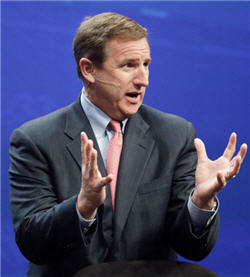HP CEO Mark Hurd talks datacenters, networking and Palm

A day after Hewlett-Packard outlined plans to invest $1 billion into its enterprise services unit and cut a net 3,000 jobs, CEO Mark Hurd elaborated on the thinking behind the move, next-gen datacenters and the company's networking prospects.

Hurd wants to position HP as an IT utility company that can appeal to CIOs looking to get the CEO off his back. Hurd painted the backdrop:
CEOs are leaning on CIOs hard. If you don't know, being a CIO is I think one of the toughest jobs on the planet. You are asked to be knowledgeable about the business and knowledgeable about IT simultaneously and how those two interconnect. And I think the pressure is huge to get costs down, to keep the lights on. Because CEOs want IT to be utility. I want to turn it on, I want it to work, but I also want it to cost less. At the same time, I want money to be able to go innovate. And both are problems today and I think that is not unique across banking versus a retailer, and I don't think it is unique to China versus the US. The meeting I have with a CIO in New York is, other than the accent, roughly the same that I have in Beijing.
In a nutshell, HP is trying to address that pain point whether it calls its services private cloud, Converged Infrastructure or something else. Meanwhile, HP is holding up its own streamlining internally as a proof point that it can do the same for customers.
What took so long? Hurd said HP had a lot of streamlining to do with the EDS business. Hurd said EDS just wasn't ready to innovate. He said:
Let me try to give you some history on Enterprise Services, just so you know how complicated it was. When we bought these guys, revenue was $23 billion. So $23 billion in revenue, $22 billion in cost. They made $1 billion. That $22 billion was in 300,000 call centers. So imagine you came to the company, you got a cell phone, you got a PC and you got three call centers. Every employee was in -- had three separate call centers. So think of this as the natural cost of the business was $33 billion, $34 billion; so about $11 billion, $12 billion was eliminated at the corporate level through these 300,000 accounts. So complexity with a capital C. At the same time, the sales force was tiny. So here was a group growing 1%, couldn't afford to expand its sales force, and frankly, carried a lot of cost with it.
Now that HP has made EDS more efficient, Hurd reckons he can do things "with R&D that we wanted to do from the beginning, but had to get the business to this state." So now HP will consolidate its data centers for its services unit, standardize and automate, said Hurd. The effort will save money, but also give HP a more efficient platform to grow.
Among other hot topics with HP and Hurd:
HP's networking strategy. Hurd was bullish on HP's networking prospects and its lineup of ProCurve, 3Com and the software that goes with it. Networking is a cog that HP will use to sell an IT stack. Hurd said it wants to be No. 1 in servers, No. 2 in storage and No. 2 in networking. From there, HP can "mix and match based on the job at hand." HP is planning to take share from Cisco in networking too. Hurd said that at the end of the last quarter, HP landed two Fortune 50 deals for data center products. We are in a material number of proof of concepts today, and I would expect that we would have more announcements shortly. The Palm acquisition had nothing to do with being in the smartphone business. Hurd said that the company isn't going to "spend billions of dollars trying to go into the smartphone business; that doesn't in any way make any sense." Hurd added:
We didn't buy Palm to be in the smartphone business. And I tell people that, but it doesn't seem to resonate well. We bought it for the IP. The WebOS is one of the two ground-up pieces of software that is built as a web operating environment...We have tens of millions of HP small form factor web-connected devices...Now imagine that being a web-connected environment where now you can get a common look and feel and a common set of services laid against that environment. That is a very value proposition.
Related:
- HP cuts jobs in restructuring, invests private cloud infrastructure
- HP earnings: Solid quarter and better full-year outlook
- Palm's WebOS, intellectual property touched off bidding war
Update:
On Thursday, HP sought to clarify Hurd's comments, which weren't materially different than what he said on the company's earnings conference call. A spokeswoman said:
When we look at the market, we see an array of interconnected devices, including tablets, printers, and of course, smartphones. We believe WebOS can become the backbone for many of HP's small form factor devices, and we expect to expand webOS’s footprint beyond just the smartphone market, all while leveraging our financial strength, scale, and global reach to grow in smartphones.